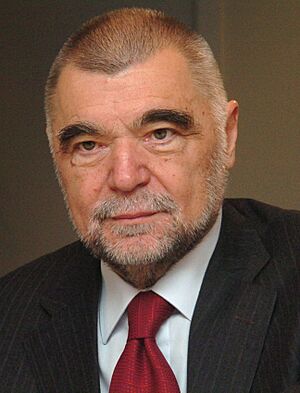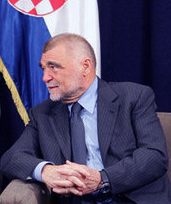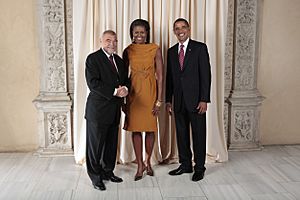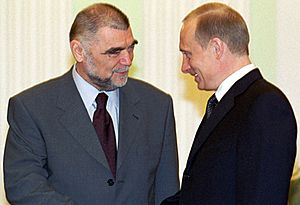Stjepan Mesić facts for kids
Quick facts for kids
Stjepan Mesić
|
|
|---|---|
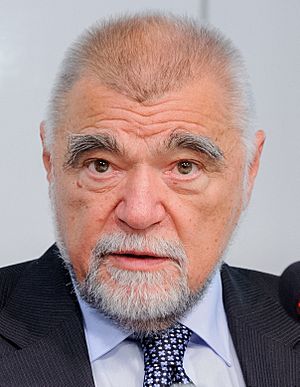
Mesić in 2012
|
|
| President of Croatia | |
| In office 19 February 2000 – 18 February 2010 |
|
| Prime Minister | Ivica Račan Ivo Sanader Jadranka Kosor |
| Preceded by | Franjo Tuđman Zlatko Tomčić (acting) |
| Succeeded by | Ivo Josipović |
| Speaker of the Croatian Parliament | |
| In office 7 September 1992 – 24 May 1994 |
|
| President | Franjo Tuđman |
| Preceded by | Žarko Domljan |
| Succeeded by | Nedjeljko Mihanović |
| President of the Presidency of Yugoslavia | |
| In office 30 June 1991 – 6 December 1991 |
|
| Prime Minister | Ante Marković |
| Deputy | Branko Kostić |
| Preceded by | Borisav Jović Sejdo Bajramović (Acting) |
| Succeeded by | Position abolisheda |
| Vice-President of the Presidency of Yugoslavia | |
| In office 24 August 1990 – 15 May 1991 |
|
| President | Borisav Jović |
| Prime Minister | Ante Marković |
| Preceded by | Stipe Šuvar |
| Succeeded by | Branko Kostić |
| Member of the Presidency of Yugoslavia for the Republic of Croatia | |
| In office 24 August 1990 – 6 December 1991 |
|
| President | Borisav Jović Sejdo Bajramović Himself |
| Preceded by | Stipe Šuvar |
| Succeeded by | Position abolished |
| Prime Minister of Croatia | |
| In office 30 May 1990 – 24 August 1990 |
|
| President | Franjo Tuđman |
| Preceded by | Antun Milović |
| Succeeded by | Josip Manolić |
| Secretary of the Non-Aligned Movement | |
| In office 30 June 1991 – 6 December 1991 |
|
| Preceded by | Borisav Jović |
| Succeeded by | Branko Kostić |
| Personal details | |
| Born | 24 December 1934 Orahovica, Yugoslavia (now Croatia) |
| Political party | Independent (2000–present) |
| Other political affiliations |
SKH (1955–1990) HDZ (1990–1994) HND (1994–1997) HNS (1997–2000) |
| Spouse |
Milka Dudunić
(m. 1961; died 2024) |
| Children | 2 |
| Alma mater | University of Zagreb |
| Profession | Lawyer |
| Signature | |
| a Branko Kostić assumed the powers and duties of the office as acting president upon Mesić's resignation | |
Stjepan "Stipe" Mesić (born December 24, 1934) is a Croatian lawyer and politician. He served as the President of Croatia for two terms, from 2000 to 2010. Before becoming president, he held many important roles. He was the prime minister of Croatia in 1990. He was also the last president of the country of Yugoslavia in 1991. Later, he became the speaker of the Croatian Parliament from 1992 to 1994.
Contents
Early Life and Education
Stjepan Mesić, often called "Stipe," was born in Orahovica, which was then part of Yugoslavia. His mother passed away when he was young. He was cared for by his grandmother and later by his stepmother.
His father joined the Yugoslav Partisans during World War II. The Mesić family often had to move to safe places during the war. After the war, they settled in Našice and then Osijek, where Stipe went to elementary school and started high school.
In 1949, his family moved back to Orahovica. Stipe finished high school in Požega in 1955. He then went on to study law at the University of Zagreb, graduating in 1961. That same year, he married Milka Dudunić, and they had two daughters. After college, he worked in courts and served in the military.
Political Career
In 1966, Mesić started his political journey. He was elected to his local council as an independent candidate. In 1967, he became the mayor of Orahovica. He also became a member of the Croatian Parliament.
As mayor, Mesić tried to build a private factory in his town. This was a new idea in Yugoslavia at the time. However, the country's leader, Josip Broz Tito, did not approve of it.
Supporting Change in Croatia
In the 1970s, Mesić supported a movement called the Croatian Spring. This movement wanted more equality for Croatia within Yugoslavia. Because of his support, he was accused of "enemy propaganda." He was sentenced to jail and served one year in Stara Gradiška prison in 1975.
Return to Politics and Key Roles
Mesić returned to politics in 1990. He was elected as a member of the Croatian Democratic Union (HDZ). He quickly became the general secretary of the party. Soon after, he became the Prime Minister of Croatia. He served in this role from May to August 1990.
After this, he became the vice-president of the Socialist Federal Republic of Yugoslavia. In 1991, it was his turn to become the president of Yugoslavia. However, some members tried to stop him. After international pressure, he was appointed president on July 1, 1991. He was the last president of Yugoslavia before it broke apart.
As Yugoslavia began to dissolve, Mesić resigned from his position in December 1991. He stated that his role was no longer important because Yugoslavia "no longer exist[s] anymore."
Speaker of Parliament and New Parties
After Croatia became independent, Mesić served as the Speaker of the Croatian Parliament. He held this position from 1992 to 1994.
In 1994, Mesić left the HDZ party. He formed a new party called the Croatian Independent Democrats (HND). He said he disagreed with some of the government's policies at the time. Later, in 1997, Mesić and many HND members joined the Croatian People's Party (HNS).
Presidency of Croatia
After the death of President Franjo Tuđman in 1999, Mesić ran for president. He won the 2000 Croatian presidential election in February 2000. He was supported by several political parties. He received 41% of the votes in the first round and 56% in the second round.
As president, Mesić often spoke about opening Croatia's economy to foreign investment. He also made changes in the military leadership, stating that active officers should not write public political letters without approval.
Mesić was very active in foreign policy. He worked to help Croatia become a member of the European Union and NATO. He also worked to improve relations with neighboring countries, including Serbia. He even attended the funeral of the Serbian Prime Minister Zoran Djindjic in 2003.
He also improved Croatia's relations with Libya. This was done by exchanging visits with the Libyan leader Muammar al-Gaddafi.
Mesić was reelected in January 2005 for a second five-year term. He was a very popular politician in Croatia during his time as president. His second term ended in 2010, and he was followed by Ivo Josipović.
In 2006, Mesić was made an honorary citizen of Podgorica, the capital of Montenegro.
There were some discussions about Mesić's past statements from the 1990s. He later apologized for some of these statements. In 2008, he compared some political policies in the region to those of the former Serbian President Slobodan Milošević.
Legal Challenges
During and after his presidency, Stjepan Mesić faced several legal challenges. These included lawsuits related to his public statements and accusations regarding his past actions. In one case, he was ordered to pay compensation for a statement he made. Another case involved accusations about vehicle purchases for the Croatian Army. He also faced a defamation lawsuit regarding his presidential campaign funding, which was decided against him.
In 2015, a court in Finland sentenced two executives from a company called Patria. They were found guilty of bribing officials in Croatia. The charges suggested that money was used to bribe President Mesić and another company director.
Activities After Presidency
After his presidential term ended, Mesić continued to be active in politics. In early 2019, he helped found the "Podgorica Club" in Montenegro. This group is a political initiative for former presidents and prime ministers from the region.
He also participated in the Inaugural Conference of the International Association of Parliamentarians for Peace in 2017 in Pristina, Kosovo.
Awards and Honors
Stjepan Mesić has received many awards and honors from different countries.
International Awards
| Award or decoration | Country | Date | |
|---|---|---|---|
| Grand Cross with Chain of the Order of the Star of Romania | June 2000 | ||
| Grand Star of the Decoration of Honour for Services to the Republic of Austria | 2001 | ||
| Knight Grand Cross with Grand Cordon of the Order of Merit of the Italian Republic | 5 October 2001 | ||
| Grand Cross of 1st class of the Order of the White Double Cross | 2001 | ||
| Honorary Knight Grand Cross of the Order of St. Michael and St. George | December 2001 | ||
| Grand Cross of 1st class of the Order of Friendship | 15 April 2002 | ||
| Grand Cross with Chain of the Order of Merit of the Republic of Hungary | 2002 | ||
| Honorary Recipient of the Order of the Crown of the Realm | 2002 | ||
| Honorary Companion of Honour of the National Order of Merit | 26 October 2006 | ||
| First Class of the Order of Prince Yaroslav the Wise | 24 May 2007 | ||
| Medal of Pushkin | 31 October 2007 | ||
| Commander Grand Cross with Chain of the Order of the Three Stars | 2008 | ||
| Order of the Republic | 23 December 2008 | ||
| Grand Cross of the Order of Saint-Charles | 16 April 2009 | ||
| Grand Cross with Collar of the Order of the White Rose of Finland | 2011 | ||
| National Flag Order | 2018 | ||
| Knight Grand Cross of the Order of the Knights of Rizal | 17 February 2024 | ||
Croatian Awards
| Award or decoration | Country | Date | |
|---|---|---|---|
| Grand Order of King Tomislav | 11 July 2005 | ||
Honorary Citizenships
| Honor | Country | Date | |
|---|---|---|---|
| Honorary Citizen of Podgorica | 2007 | ||
| Honorary Citizen of Trogir | 2009 | ||
| Honorary Citizen of Istria | 2009 | ||
| Honorary Citizen of Bihać | 2009 | ||
| Honorary Citizen of Pristina | 2009 | ||
| Honorary Citizen of Opatija | 2010 | ||
| Honorary Citizen of Tetovo | 2012 | ||
| Honorary Citizen of Shengjin | 2013 | ||
| Honorary Citizen of Tirana | 2013 | ||
See also
 In Spanish: Stjepan Mesić para niños
In Spanish: Stjepan Mesić para niños
- Cabinet of Stjepan Mesić
 | Delilah Pierce |
 | Gordon Parks |
 | Augusta Savage |
 | Charles Ethan Porter |


